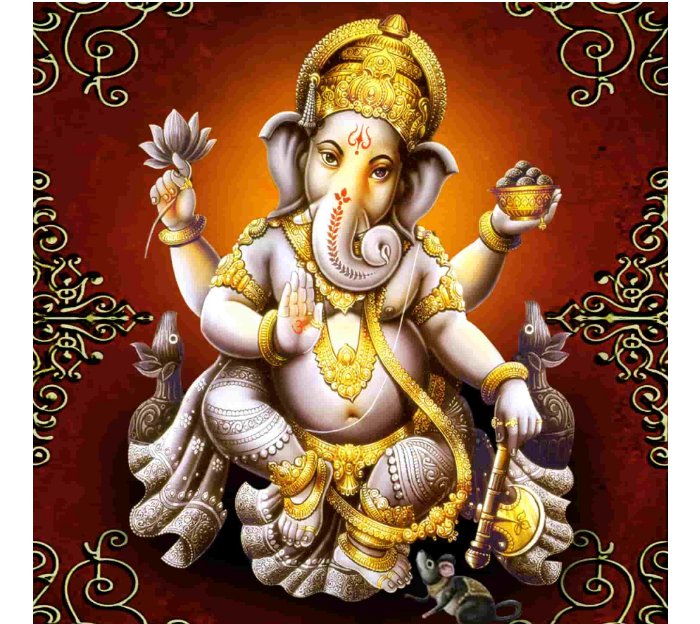Ganesha: Elephant-Headed God Of Knowledge, Learning, Literature And Scribe Of The Mahabharata
A. Sutherland - AncientPages.com - It is commonly believed that the Elephant God, Ganesha (Ganesh, in Hindi word) means success and wealth; therefore people place a statue or a figurine of the Ganesha, in his store, or another place of their business.
Ganesha is one of the best-known and loved deities in the Hindu pantheon of gods and indeed is the most recognized of the Hindu gods outside of India.
Lord Ganesha. Image credit: Jayananda sagar - CC BY-SA 3.0
He is the Lord of Good Fortune, the Lord of Beginnings, and the Remover of Obstacles and evils people meet in their lives, but he can also place obstacles in the path of those who need to be checked. He is also considered the destroyer of pride, selfishness, vanity.
Ganesha protects homes and cars. People often place a Ganesha statue or medallion on the front dash of their cars. Ganesha is also associated with learning and study, scribes, schools, and wisdom.
It is he who transcribed the Mahabharata while the poet Vyasa recited it. The elephant-headed son of Parvati and Shiva, Ganesha (Ganapati) with a bulky belly and four hands, is the subject of many myths.
One myth in the Shiva Purana explains his elephant-head, it is said that he was created by his mother Parvati ( daughter of the mountain) using earth, which she molded into the shape of a boy.
One day, while Shiva was away, Parvati wanted to take a bath but there was no one to guard the door. So she formed a little boy from clay and breathed life into him. She instructed him to guard the entrance to her bathroom, while she bathed.
Ganesha - the God of Powers, Abilities, wisdom, knowledge, intelligence, arts, and Skill Ganesha possesses the traditional bodily attributes of the Hindu gods, which includes superhuman strength, superhuman stamina, endurance, resistance to harm, and enchanted longevity. Image credit: Pradeep Kumar Sharma - CC BY-SA 4.0
Unexpectedly Shiva returned and was furious that the boy at the door would not let him in to see his wife. In his rage, he cut off the boy’s head. Parvati came rushing out and was horrified by what Shiva had done. She told him that this was their son. Shiva ordered a new head to be found for the boy and, as the first animal available was an elephant, so Ganesha gained a new head and became the most unique of the Hindu gods.
The boy was short and fat with a red face, but in some deeper sense, he was very beautiful. He was named Ganesh, “Lord of his father’s ganas” (“hosts”) and a small mouse often showed on his depictions, became his vahana (vehicle) to ride on.
Ganesha is portrayed as standing, sitting, dancing, or crawling as a child, or even sitting on his mother's knee.
His image is found everywhere, in many different forms. Ganesh is widely worshiped in all parts of India, regardless of people’s spiritual affiliations and his characteristics and the attributes that have evolved over the centuries of Indian history.
Written by – A. Sutherland AncientPages.com Staff Writer
Copyright © AncientPages.com All rights reserved. This material may not be published, broadcast, rewritten or redistributed in whole or part without the express written permission of AncientPages.com
Expand for referencesMore From Ancient Pages
-
 Huge 1,400-Year-Old Hall Of The First Kings Of East Anglia Discovered In Rendlesham
Archaeology | Oct 5, 2022
Huge 1,400-Year-Old Hall Of The First Kings Of East Anglia Discovered In Rendlesham
Archaeology | Oct 5, 2022 -
 Historic Graffiti Made By Soldiers Sheds Light On Africa’s Maritime Heritage – New Study
Archaeology | May 6, 2022
Historic Graffiti Made By Soldiers Sheds Light On Africa’s Maritime Heritage – New Study
Archaeology | May 6, 2022 -
 Dunstanburgh Castle: Underground Passageways And The Legend Of Sir Guy The Seeker
Featured Stories | Apr 5, 2016
Dunstanburgh Castle: Underground Passageways And The Legend Of Sir Guy The Seeker
Featured Stories | Apr 5, 2016 -
 New Video Footage Reveals Intriguing Viking-Style Shipwreck At The Bottom Of Norway’s Largest Lake Mjøsa
Archaeology | May 5, 2023
New Video Footage Reveals Intriguing Viking-Style Shipwreck At The Bottom Of Norway’s Largest Lake Mjøsa
Archaeology | May 5, 2023 -
 Scribes: One Of The Noblest And Highly Recommended Professions In Ancient Egypt
Featured Stories | May 10, 2023
Scribes: One Of The Noblest And Highly Recommended Professions In Ancient Egypt
Featured Stories | May 10, 2023 -
 Day Of The Dead: From Aztec Goddess Worship To Modern Mexican Celebration
Ancient Traditions And Customs | Oct 30, 2019
Day Of The Dead: From Aztec Goddess Worship To Modern Mexican Celebration
Ancient Traditions And Customs | Oct 30, 2019 -
 Incredible Ancient Extinct World Of Unknown Organisms Discovered
Evolution | Jun 8, 2023
Incredible Ancient Extinct World Of Unknown Organisms Discovered
Evolution | Jun 8, 2023 -
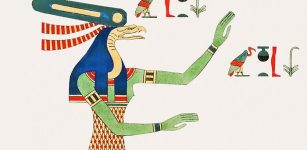 Wadjet – Egyptian Goddess Protected Pharaohs And Was Depicted As A Cobra-Uraeus
Egyptian Mythology | May 29, 2021
Wadjet – Egyptian Goddess Protected Pharaohs And Was Depicted As A Cobra-Uraeus
Egyptian Mythology | May 29, 2021 -
 Lost City That May Have Defeated King Midas’ Kingdom Phrygia – Found Accidentally
Archaeology | Feb 23, 2020
Lost City That May Have Defeated King Midas’ Kingdom Phrygia – Found Accidentally
Archaeology | Feb 23, 2020 -
 Undiscovered Neanderthal Artifacts From The Ice Age Are Submerged Below The Waves Of The English Channel
Archaeology | Nov 23, 2022
Undiscovered Neanderthal Artifacts From The Ice Age Are Submerged Below The Waves Of The English Channel
Archaeology | Nov 23, 2022 -
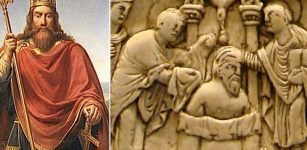 What Was Lex Salica?
Ancient History Facts | Dec 13, 2017
What Was Lex Salica?
Ancient History Facts | Dec 13, 2017 -
 One-Eyed Giants Fachan Were As Dangerous As Polyphemus And The Cyclops
Celtic Mythology | May 21, 2019
One-Eyed Giants Fachan Were As Dangerous As Polyphemus And The Cyclops
Celtic Mythology | May 21, 2019 -
 What Are The Most Common Misconceptions About Pirates?
Ancient History Facts | Apr 16, 2024
What Are The Most Common Misconceptions About Pirates?
Ancient History Facts | Apr 16, 2024 -
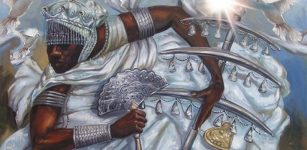 Obatala ‘King Of The White Cloth’ And Creation Story Of Yoruba People
African Mythology | Jan 9, 2021
Obatala ‘King Of The White Cloth’ And Creation Story Of Yoruba People
African Mythology | Jan 9, 2021 -
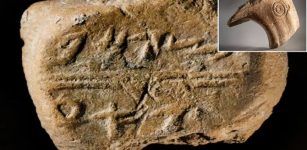 Part Of Jerusalem’s Wall Destroyed By The Babylonians In 586 BC – Unearthed
Archaeology | Jul 30, 2021
Part Of Jerusalem’s Wall Destroyed By The Babylonians In 586 BC – Unearthed
Archaeology | Jul 30, 2021 -
 Underwater City: Unveiling The Secrets At The Bottom Of Fuxian Lake
Featured Stories | Jun 13, 2015
Underwater City: Unveiling The Secrets At The Bottom Of Fuxian Lake
Featured Stories | Jun 13, 2015 -
 Bronze Age And Iron Age City Complex Once Known As Kummanni Unearthed In Turkey
Archaeology | Dec 4, 2018
Bronze Age And Iron Age City Complex Once Known As Kummanni Unearthed In Turkey
Archaeology | Dec 4, 2018 -
 Settlement Of Europe: Result Of Several Migration Waves By A Single Population – Study
Archaeology | Jul 17, 2020
Settlement Of Europe: Result Of Several Migration Waves By A Single Population – Study
Archaeology | Jul 17, 2020 -
 Researchers Confirm Museum Shrunken Head As Human Remains
Archaeology | Aug 4, 2022
Researchers Confirm Museum Shrunken Head As Human Remains
Archaeology | Aug 4, 2022 -
 Mysterious 7,000-Year-Old Circular Structure Near Prague Investigated By Scientists
Archaeology | Sep 14, 2022
Mysterious 7,000-Year-Old Circular Structure Near Prague Investigated By Scientists
Archaeology | Sep 14, 2022


